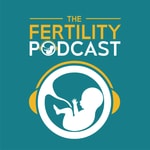The Fertility Podcast – Details, episodes & analysis
Podcast details
Technical and general information from the podcast's RSS feed.

The Fertility Podcast
Natchat Productions
Frequency: 1 episode/12d. Total Eps: 169

Recent rankings
Latest chart positions across Apple Podcasts and Spotify rankings.
Apple Podcasts
🇬🇧 Great Britain - mentalHealth
23/05/2025#84🇬🇧 Great Britain - mentalHealth
10/09/2024#93
Spotify
No recent rankings available
Shared links between episodes and podcasts
Links found in episode descriptions and other podcasts that share them.
See all- https://www.instagram.com/stories
1733 shares
- https://www.instagram.com/janmurrayuk
140 shares
- https://www.instagram.com/fertilitypoddy
108 shares
- https://www.thecalmzone.net/
540 shares
- https://www.janetmurray.co.uk
305 shares
- https://www.tommys.org/
125 shares
RSS feed quality and score
Technical evaluation of the podcast's RSS feed quality and structure.
See allScore global : 63%
Publication history
Monthly episode publishing history over the past years.
Anniversary Episode!
lundi 2 septembre 2024 • Duration 28:10
Welcome back to what is the very beginning of a new series, with new voices that bring new and different fertility information for your ears.
This episode is a special one, as Kate is joined by a very familiar voice, Natalie, the founder of the podcast and now Exec-producer. You might not know this but this year is The Fertility Podcast’s 10 year anniversary! In this episode, Natalie and Kate reflect on the last 10 years with laughter and a few tears…….
The two catch up with what they have been doing over the summer and Natalie gives an insight into the work that she is now doing with Fertility Matters at Work and The F Word Podcast. As well as this, Natalie talks about receiving the award for Best Fertility Podcast in Amsterdam. She explains that it was a surreal moment for her and the pod, which is now celebrating 10 years.
Together they chat about the last decade and how much change the fertility world has seen, with things like the IVF add-ons and new treatments for those struggling with infertility. Natalie and Kate chat about the development of new drugs that are being tested to better fertility treatment.
The Fertility Podcast has helped so many people throughout the years, bringing patient stories and advice from experts to your ears. It has been a journey, from Natalie starting a decade ago in her booth, to Kate taking the reins solo 18 months or so ago.
This podcast has been a way for voices to be heard and listened to, a way of letting you know that you aren’t alone and there is support out there for you. It has also helped you to advocate for yourself and both Kate and Nat feel honoured to have helped in just a small way.
Unfortunately, this episode also has an announcement that comes with a heavy heart. The Fertility Podcast will be taking a long hiatus at the end of this series. Kate is hanging up her headphones and turning off her mic and is on to pastures new.
However, this is not the definite end of the podcast, Kate and Nat may well be popping on now and again and……..if you perhaps are thinking about starting podcasting or would like to give it a go, please do get in touch with Nat. Maybe you could be the next guest presenter of the podcast………
We are delighted that the current series is being sponsored by Proceive who are kindly offering all listeners to The Fertility Podcast 15% off any Procieve purchase, when you use the discount code FP15.
The F Word on The Fertility Podcast
lundi 22 juillet 2024 • Duration 14:58
Clean out your ears as you're in for a treat. Over the coming weeks, as we will the British Summer to impress us, we're going to be sharing with you right here on The Fertility Podcast feed, The F Word at Work episodes, which is the podcast created by Fertility Matters at Work and its what has kept Natalie busy for the last 18 months and why Kate has been at the helm of The Fertility Podcast.
Hopefully it will be useful for you if you've been trying to find the words to talk about what you are going through at work, as there's lots of examples of how support has been implemented and even if you share it with some colleagues so they get a better understanding of what you are going through, that will in itself make a difference.
Be sure to subscribe if you've not already, so you don't miss anything and you can also follow The F Word wherever you get your apps and also follow Fertility Matters at Work on insta to stay up to date on all the amazing work it is doing to raise awareness of fertility issues in the workplace.
Winning awards with fertility support - Nuveen - The F Word at Work
lundi 22 avril 2024 • Duration 15:01
Welcome to another episode of The F Word at Work, where we delve into the vital conversations surrounding fertility in the workplace. Today, we're honored to host Gemma Young, Senior Managing Director at Nuveen, a driving force in shaping marketing strategies across EMEA and Asia Pacific.
Gemma Young, is an esteemed marketing leader, takes center stage, steering Nuveen's marketing endeavors while chairing the business resource group "achieve," dedicated to females and female allies.
What we discussed:
- Gemma's personal journey fuels her dedication to address fertility challenges in the workplace, propelling Nuveen to pioneer impactful initiatives.
- Nuveen's proactive stance in fostering fertility conversations through a robust event program.
- Insightful panel discussions and networking sessions covering diverse topics from IVF to LGBTQ family building.
- Addressing crucial health issues like PCOS and endometriosis to foster a supportive environment.
- Witness the ripple effects: heightened awareness, enhanced employee support, and policy shifts like the introduction of fertility leave.
- Gemma's brilliant work internally won an award via the business resource group.
- Gems of wisdom for initiating similar dialogues: leverage existing affinity groups, engage HR, and rally supportive leadership.
- Proactive measures are key; continuous dialogue and awareness pave the way for meaningful change.
Stay Connected:
Follow The F Word at Work for access to our free resources:
- Download our guidance here.
- You can book a call to speak with us here.
- Explore our services and subscribe to our newsletter here.
- Join our vibrant community on Instagram, X, and LinkedIn.
Join the Conversation:
Don't miss out on the dialogue. Follow and engage
Launching a pregnancy loss policy with Channel 4's, 4 Women Network
Season 2 · Episode 1
lundi 1 novembre 2021 • Duration 33:20
It’s great to be back! We’ve had a bit of a break and we’re back with a new series talking all about Fertility in the workplace. As well as doing the podcast, Natalie’s voiceover work and Kate’s consulting; for the last 18 months or so, both Natalie and Kate have been working with organisations to help put fertility in the workplace firmly on their wellbeing agenda.
How does the landscape at work look?
Kate and Natalie discuss what we've heard from our work and how in light of, how in the last few months, a number of organisations have published fertility and pregnancy loss policies.
Over the coming weeks we will be hearing from different organisations who are speaking out about their work to support employees on their paths to parenthood and this new series of the podcast has been created alongside an exciting launch of a brand new training and policy programme from Fertility Matters at Work which we'll be talking about in the coming weeks too.
We’ll be sharing best and worst examples of fertility in the workplace and, as always, sharing your personal experiences, so we want you to get in touch and share yours stories which can you do right here
4 Women
In the first episode of our new series on Fertility Matters at Work we’re absolutely delighted to welcome Channel 4 to the podcast. Navene Alim who is a senior lawyer within the corporate legal team at C4 and Landy Slattery, creative director of All 4, Channel 4’s(CH4) on-demand platform. Both are the co-founders and co-chairs of the 4 Women network, and we’re talking all about CH4’s Pregnancy Loss Policy that was launched in April 2021.
When the pregnancy loss policy was launched, CH 4 stated that “The policy which was believed to be the world’s first is to support both women and men who have been affected: whether it happens directly to them, their partner or their baby’s surrogate mother, regardless of the nature of their loss, and whatever their length of service. It also recognises pregnancy loss as an experience not isolated to women or heterosexual couples.”
Why was the policy developed?
Following the huge momentum and notoriety that came from CH4's menopause policy the 4 Women network wanted to build on this. After surveying employees to find out the most important issues, pregnancy loss was identified as a huge issue for the workforce. They found that people were struggling in silence and making excuses for needing time off. CH4 were due to air a new series – Baby Surgeons delivery miracle babies ( quoted incorrectly in the pod ) and they wanted to get a policy in place to hit with the time the series aired.
CH4 share how they implement the policy they developed and wanted to ensure that training would be available for managers and colleagues to help them, support employees, appropriately. They are actively trying to find the right solutions to provide the correct support. Their policy is the first step in acknowledging that pregnancy loss is part of a woman’s working life. Having the conversations and the educational piece is the first steps in changing organisational...
Childless not by choice
Episode 33
lundi 4 octobre 2021 • Duration 35:49
In this episode, as we near the end of this current series of the podcast, we chat with Steph Phillips the founder of World Childless Week.
World Childless Week is a relatively new initiative raising awareness of being childless not by choice. Steph tells us how the interest in this week, but also across the year, has increased dramatically over the last 2 years. We also talked about the differing terminology used to explain living without children and how Steph as learned to own the term ‘Childless’.
The World Childless Week website encourages people to submit blogs and videos to get their voices and stories heard. Steph has noticed in recent weeks that this is gaining more momentum and people are wanting to take ownership of their childlessness.
The COVID pandemic has highlighted the difficulties in the workplace faced by childless people – the discussions on Zoom about children, children seen on Zoom etc. However, the pandemic has also encouraged greater awareness surrounding mental health for example and Steph also sees this as a positive for sharing childless awareness. The sharing the commonality of childlessness has had a profound effect on Steph and others, providing validation and an outlet for grief. We also talked about finding the humour and laughter that can come with sharing stories and that it is possible to come through the dark days.
We discuss the narrative surrounding childlessness and how frequent the insensitive comments are heard, such as ‘Have you thought about adoption’. This needs to change. Steph recommends listening to this webinar - which will help to highlight what not to say to a childless individual.
Did you know that there is more childless men than women?
Men rarely speak out, but they need to be heard more.
Steph talks about the desire many childless individuals have to leave a legacy and why it is important for us not to be forgotten. Steph now tries to leave a legacy in a different way – she may compliment someone on their leggings or let a car out in front of her. This small action can make their day and never hurts to be kind.
Next steps, Steph hopes to make a difference in raising awareness of childlessness in the workplace. Steph welcomes submissions on any topic for the website. See below for more information on how you can do this.
SOCIALS:
Releasing Our Grief through the Power of Words (good to help people find the confidence to start exploring the cathartic power of writing):
Other episodes we mentioned:
Jessica Hepburn
Parenting after IVF
Episode 32
lundi 27 septembre 2021 • Duration 42:29
Today we’re talking all about what happens after fertility – parenting after IVF. What is it like to be pregnant and then parenting after you’ve gone through a fertility journey? Is it different if you’ve not experienced this rollercoaster journey and you’ve managed to conceive naturally? To find out, we’re giving a big welcome to a previous guest and friend of the podcast – Cat Strawbridge otherwise known as @tryingyears.
Cat, after 7 years of trying to conceive and multiple rounds of IVF, finally became a mum to beautiful Wren, who has recently celebrated her 2nd birthday. Cat works tirelessly to break the silence surrounding infertility, has her own podcast The Finally Pregnant Podcast, consults within the fertility industry, host events and to top it all is now (at time of writing) embarking on fertility treatments to try for a sibling for Wren.
We’re delighted to chat to Cat again and wanted to ask her what are the most common fears for women who have conceived following fertility treatments? Cat didn’t hesitate in answering – the anxiety. The anxiety of pregnancy, ‘scanxiety’ and once parenting the fear of being an overbearing and anxious parent.
You may not have heard the term ‘scanxiety’ before but we suspect you’ve felt it. It’s that anxiety you get every time before and during a scan. Whether it be a fertility or pregnancy scan, that fear never leaves you. Cat talked about her pregnancy with Wren and her need to have regular reassurance by having a scan. Particularly as sadly, Cat lost Wren’s twin sister in early pregnancy. Cat talks about how ‘scanxiety’ starts from the moment she’s booked the scan until she’s had the reassurance that everything is OK. We talked about Cat’s experiences of how the scanning professionals dealt with her anxiety, which luckily was generally positive, however we all know that sometimes bad news isn’t delivered in the best way and many professionals seem to lack empathy. A recent guest Amber Isso termed this ‘empathy fatigue’.
Kate recently had the pleasure of listening to a webinar Cat did for ESHRE week on hope and how professionals can help patients maintain hope by treating them respectfully and honestly and acknowledging that it is the patient’s fertility journey. Whilst health professionals are becoming more informed on how to speak to patients, she feels that there is still a long way to go.
Cat then spoke about her decision to try for another baby with her remaining embryo and how this has been a difficult decision to make, especially as this is her last shot. She is feeling overwhelmed, excited and petrified but hopes that this time around she has more knowledge and the resilience to cope better. Kate talked about how the emphasis on a second attempt at IVF after having success is so different. The first time it’s on your having a baby, the second its on having a sibling for your child, so the pressure is totally different.
We also discuss Cat’s feelings on the COVID-19 vaccine and how she has had one but plans to delay the second one for now.
Since recording Cat has shared that her FET didn’t work and has spoken about it on her socials. We send Cat all our love and thank her for talking to us.
Other episodes mentioned:
Katie Eaves who is working to support midwives understand how to talk to pregnant women who have been through infertility
We also spoke in a previous episode with Julianne Boutelab about the fears we have on becoming parents.
SOCIALS:
Surrogacy Abroad and in the UK
Season 2 · Episode 30
dimanche 12 septembre 2021 • Duration 45:27
This week we are discussing Surrogacy, both in the UK and abroad. Our first guest is Anna Buxton, mum of three children through two different surrogates. Anna talks us through her decision of how they reached surrogacy after a long and painful gynecological history and was told Surrogacy was her only hope as she would never carry.
Not carrying your child and grieving for that loss
Anna voices the fear of so many people considering surrogacy,
They were able to create embryos yet still it was v.difficult. Feels like you are giving up on the hope of ever carrying a child, your husband seeing you pregnant, you feel lost.
Ripple effect… you think you are going to get pregnant, then you realize it's not going to happen as you thought. She couldn’t find anyone to talk to about surrogacy.
Started in the UK - charities, and agencies but all had really long waiting lists and they’d already spent 5 years trying to get pregnant, and couldn’t deal with another wait of 3 years. She found a few couples to talk to but didn’t have access to the Insta community that exists today.
Anna talks about how she now realizes that Surrogacy was the light at the end of the tunnel for them and how incredible the women are who do it. She describes how Surrogacy is so complex of the process was something she buried herself in which helped her almost deal with the grief of not being able to carry.
Surrogacy in India
India had the longest reputation of surrogacy but had been shrouded in bad press and was halted for a while. They visited 10 clinics and found a Dr and clinic they loved who were running a lovely program all centered around the wellness of the surrogate. They started the IVF process in the UK and then had egg collection and embryos fertilized in India and then were found a surrogate. She still had nobody to talk to about this.
Complications of Surrogacy Abroad
The first step is to find a lawyer who is really experienced.
The pregnancy was difficult - people weren’t talking about it, so Anna didn’t tell hardly anyone until about 24 weeks.
It felt hard to believe
She worried that people thought she was undeserved of being pregnant because she wasn’t carrying the bump. Anna describes skulking around John lewis looking at prams, terrified someone would ask her why she was there and she was asked who she was buying the pram for and she said she mumbled ‘it’s complicated’ and walked off as she wasn’t ready to tell a stranger.
Anna explained how you never know if someone is going to say ‘congrats’ or if they will ask complicated questions. She walked away and ordered everything online.
Telling Work
Anna explained how they talked to close friends who were really supportive but she was worried about work as she was the first person who had done it, was concerned about her position. She told them at 24 weeks, however, they had no policy for anyone doing surrogacy.
How they talk to their children
They’ve talked about how children are bought into the world. They have pictures and memorabilia of India all around. They talk about how Mummy’s tummy is broken and another mummy helped to grow her. They celebrated Divali, making sure to normalize her culture and how she was bought into the world. Isla - 5 Always say thank you to Sheparla her surrogate and India. They don’t have a relationship with her as she didn’t want to and also doesn’t speak English. Anna writes a letter every year to her clinic with a picture of Isla both to Sherparla and her children. It’s different with the twins as they are in touch with Holly, her surrogate in San Diago, and has pictures of her in their nursery. They are still in contact with her. Surrogacy is an everyday...
Our second...
Donor Sperm and Treatment abroad
Season 2
dimanche 5 septembre 2021 • Duration 49:43
In this episode, we’re talking about donor sperm and treatment abroad. We have discussed donor conception on the podcast before and refer throughout the episode to previous chats we’re had as we’ve spoken to egg donors, as well as organizations that help match you with donors both in the UK and abroad and we’ve heard your stories about having treatment abroad with a donor egg or sperm, for a multitude of reasons.
The idea of using a donor to make your baby can take a lot of time to get your head around and it's so important to get support and there are brilliant organizations to guide you. We’ve chatted with the Donor Conception Network who have been around for a long time, working on the narrative about how we talk about this with our loved ones.
More recently, the brilliant Becky Kearns who is @defiingmum on Instagram has launched her Paths to Parents hub which is to support people looking at donor conception and Becky is working tirelessly to provide webinars and an amazing support network to help answer the many questions that come with donor conception.
Our first guest is JR Silver who has created a wonderful children's book called Sharing Seeds.
JR was diagnosed with the BRCA1 and sadly lost his sister to breast cancer 9 months later. The family had realized there was a line of females that had passed away young
Sister died 9 months later. It was when he went to find out about PGD testing to see whether they could take sperm and have it analyzed to see if they would only put forward healthy sperm
What is Non‐obstructive azoospermia (NOA)
Ended up having fertility tests - he found out that he had zero sperm which is defined as Non‐obstructive azoospermia (NOA) Definition - no sperm in the ejaculate due to failure of spermatogenesis and is the most severe form of male infertility. The etiology of NOA is either intrinsic testicular impairment or inadequate gonadotropin production.
JR went on to have more tests to confirm the condition and then went on to see a Urologist and had two operations to try and retrieve sperm over the coming year. He and his wife had a strong support network and also gained more support and also funding from the Jewish infertility charity Chana
Chana is close to my heart as they also supported me in the early stages of our decision to donate our frozen embryo You can learn more about them
What’s it like choosing a sperm donor for a guy and what advice do you have for other men?
JR explained how he was on a light dose of anti-depressants felt that might have taken the edge off the choosing a sperm donor. Once the pair had got their head around it, they found it quite good fun.
JR talked about how his wife didn’t want to see pictures, but it was one of his requirements. The pair are fair in the background and they wanted someone close to his aesthetic and he said that enabled them to pick the donors based on the pictures available. The donor was from Canada and the US from Xytex
JR says to be wary of all the advice offered and encourages Men to work with their partner and look at if they can deal with the setbacks of how it feels, see it as a joint project.
How do you talk about using a sperm donor - with your friends and family?
This is such an important conversation and once we’ve also discussed on the podcast with Jana Rupnow...
See acast.com/privacy for privacy and opt-out...
**BONUS EPISODE** – IVF FUNDING EXPLAINED WITH ACCESS FERTILITY **
Season 2 · Episode 29
mardi 31 août 2021 • Duration 45:16
In this episode, Natalie and Kate are working with Access Fertility to explain what is involved when it comes to self-funding your fertility treatment. Speaking with Professor Scott Nelson who is Professor of Obstetrics & Gynaecology at the University of Glasgow, consultant for NHS Greater Glasgow and Clyde as well as the visiting Professor at the University of Bristol, Scott is the Scientific Director of The Fertility Partnership and Medical Director of Access Fertility
How do Multi-Cycle and Refund packages work for IVF?
There are several different ways to pay for private fertility, designed to make it more affordable and accessible for those who need it. The two most popular ways to self-fund are multi-cycle and refund programmes, which help families avoid escalating costs if more than one cycle is needed or get some money back if the treatment is unsuccessful.
A multi-cycle programme is where a patient pays a fixed price for multiple cycles, and the cost is the same whichever cycle is successful, or if none of them is. Once the patient has had the cycles, there are no refunds. And if the first cycle is successful, the patient can’t access any further treatment under the programme.
Up until now, these programmes have been provided independent from the medical clinics that carry out treatment, so there is a natural separation of medical and financial decisions. This means women and baby’s health is the only priority.
A refund programme allows patients to recoup up to 100% of their money if their treatment is unsuccessful. Refunds aren’t offered if the patient is successful before the end of a full programme.
How has the Pandemic impacted fertility treatment?
It has been a huge impact in the UK and after the initial chaos, what is now left is the residual waiting for appointments and treatment. Many people have found their treatment has been delayed, or are worried that their fertility has declined, while others may have been "aged out" of being eligible for NHS or other treatments. This means that some may feel they need to rush their treatment or must access more aggressive treatment. Have a listen to our previous episode about the Postcode Lottery
There has been a lot of concern about people making quick and ill-informed decisions and both Kate and Natalie were ambassadors for the Safe Campaign,
highlighting the importance of ensuring patients were making informed decisions when it comes to treatment options, despite being tempted to push their physical or mental health to the limit to get pregnant.
What we discussed:
- The options for accessing fertility treatment
- The ways of paying for private fertility treatment including multi-cycle and refund programmes and the safest ways of accessing these programmes
- The importance of not rushing your decisions and making informed choices
- How much of an impact has the closure of clinics at the start of the pandemic had on patients' decisions to self-fund rather than wait for NHS funding?
- How does it work when you are self-funding for fertility treatment?
- Why would you opt for a multi-cycle and refund package?
- How much money patients using Access Fertility programmes can expect to save
- Whether people are aware of the risks of aggressive treatment?
Scott mentioned the OPIS IVF model
Socials:
The Frozen Embryo Transfer
Season 2 · Episode 28
dimanche 29 août 2021 • Duration 43:41
Kate and Natalie discuss the Frozen Embryo Transfer, explaining what it means when it happens and how it feels when cycles don’t work.
The pair discuss how there is research to show that the success of the frozen cycle is as high as a fresh, so do not worry if you do have to freeze your embryos. With a frozen transfer, your body isn’t full of all the medication, so you’re embarking on a more natural cycle so there is also the thinking that you’re putting those previous embryos back in a more natural environment.
Amber Woodward is a brilliant blogger and former book reviewer on The Fertility Podcast.
How to prepare?
Amber talks about how she learnt about nutrition to help her get pregnant as it wasn’t happening and she had read a lot about the impact of your nutrition. Her medical records state unexplained infertility, underpinned by PCOS, Amber has had issues with her insulin and she discusses how it can make a real difference to your nutrition.
After 12 months of changing her diet, she got regular cycles and talks about how much of a difference it can make for conceiving naturally and preparing IVF. Try to improve egg quality, keep your hormones balanced which she found very difficult and food has a big impact on her emotions.
What about Eastern medicine - Chinese herbs?
Amber talked about trying eastern medicine. Chinese medicine in particular despite her partner Joe’s concerns and the disgusting taste. She said it also made her cycles go crazy. She didn’t leave herself enough space between starting it and then doing IVF as it’s not recommended when you start treatment.
Amber talked about how the pair of them had forgotten how all-consuming ‘trying again’ was and also how the treatment felt, as well as other people announcing 2nd siblings.
Working and going through FET
She was at work when she had another FET, her nutrition wasn’t great and she wasn’t really exercising, so she didn’t feel very prepared. She went into it feeling like she should have put more effort in and they had 2 embryos left and the pair had decided they weren’t doing any more fresh cycles.
What about when it doesn’t work?
When it didn’t work - the clinic said ‘it's just one of those things about 70% don’t take. You can do everything and it doesn't work and you can do the opposite and not prepare.
On the final FET, she wanted to give it her best shot and have no regrets. They didn’t need to wait very long after the failed cycle as you don’t need to treat it like an IVF cycle as you aren't’ stimulated. They were due to have the treatment in April as Covid took hold of the world. She describes how it was the best thing for them to have some time to adjust. Her clinic reopened the day before her birthday.
How long does it take?
Covid changed how the clinic did the down-regulation. In January when she cycled failed, they had 1 month of downregulation and then the oestrogen for 3-4 weeks. Then you’d have a couple of scans and then the progesterone.
During Covid, the clinics wanted to limit the number of times you went there. Instead, she was posted the oestrogen (which increased womb lining) Amber was on this for approx 3 weeks and then 4 days later she had the transfer and two weeks later she had the pregnancy result. So a 5-week process.
What if it doesn’t work and how having that conversation about ‘what if’ helped
Amber had shared on her socials about how the pair of them had talked about alternative life plans if it didn’t work. They had prepared themselves for the FET to be their last treatment. They talked about just being able to put it all...
See









